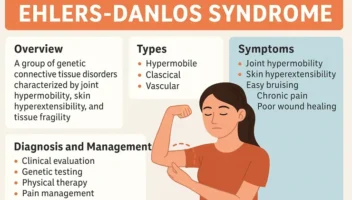Ehlers-Danlos Syndrome
Ehlers-Danlos Syndrome (EDS) is a group of rare, heritable connective tissue disorders characterized by joint hypermobility, skin hyperextensibility, and tissue fragility. It is named after two physicians—Edvard Ehlers, a Danish dermatologist, and Henri-Alexandre Danlos, a French physician—who first described its manifestations in the early 20th century. Since then, advances in genetics and clinical medicine have […]
Vitamin B6: An Essential Nutrient for Body and Mind
Vitamins are organic compounds that the human body requires in small amounts to carry out vital functions. While they do not provide calories or energy directly, they act as essential cofactors in countless biochemical reactions, keeping metabolism, growth, and overall health in balance. Among the family of B-complex vitamins, Vitamin B6 holds a particularly important […]
Fainting or Vasovagal Syncope
Fainting, also known as syncope, is a common medical phenomenon defined as a temporary loss of consciousness and postural tone, typically followed by a spontaneous recovery. Among the various causes of syncope, vasovagal syncope (also referred to as neurocardiogenic syncope) is the most prevalent. Although usually benign, it can be frightening, disruptive, and at times […]
Autism: A Comprehensive Exploration
Autism, or autism spectrum disorder (ASD), is one of the most widely discussed and researched neurodevelopmental conditions of the 21st century. As awareness increases, society is learning that autism is not a monolithic experience but a complex and diverse spectrum of traits that influence the way individuals communicate, perceive, and interact with the world. Far […]
Anti-Inflammatory Drugs
Inflammation is a fundamental biological response of the body to harmful stimuli such as pathogens, damaged cells, toxins, or physical injury. While acute inflammation is a protective mechanism essential for survival, chronic inflammation can contribute to the progression of various diseases including arthritis, asthma, cardiovascular disease, and cancer. To manage the symptoms and underlying processes […]
Complete Blood Count (CBC)
Blood is often referred to as the “river of life.” Flowing through an intricate network of vessels, it delivers oxygen and nutrients to every cell, removes metabolic wastes, fights infections, and maintains homeostasis. To assess the health of this vital fluid, one of the most common and informative tests performed worldwide is the Complete Blood […]






